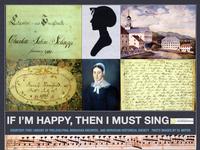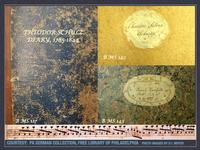Three Moravian Manuscripts in the Pennsylvania German Collection at FLP
The Pennsylvania German Collection at the Free Library of Philadelphia contains a wealth of valuable research materials available to scholars and the general public. Among these are three Moravian manuscripts:
• The Theodor Schulz Diary, 1785-1844
• Clavier und Singstücke für Charlotte Sabine Schropp, January 1799
• Music Copybook of Sarah Horsfield, July 14, 1803
Thanks to a 2011 grant from the prestigious National Endowment for the Humanities Save America’s Treasures program, all three Moravian manuscripts have been conserved by the Conservation Center for Art & Historic Artifacts in Philadelphia, and the Clavier und Singstücke für Charlotte Sabine Schropp, January 1799 will soon be available online as a fully digitized FLP e-book.
Introduction
Reading Theodor Schulz’s diary, or looking at the music copybooks of Charlotte Sabine Schropp and Sarah Horsfield is a very personal journey. Stepping back into time in Part One of If I’m Happy, Then I Must Sing we shall first explore the background common to all Moravians. In Part Two we shall make the acquaintance of Theodor Schulz, and join him as he confides to his diary his interests and observations during a four month stay in Pennsylvania from August to December, 1799. In Part Three we shall meet Charlotte Sabine Schropp, and shall learn more about her family and music copybook begun in January 1799. In Part Four we shall be introduced to Sarah Horsfield and her family, and see from examples in her music copybook started on July 14, 1803 how musical culture and life were changing both in Europe and America at the turn of the nineteenth century. In the process we shall also get a glimpse of the Moravian society in which these three individuals lived; learn how they contributed their talents and skills; and what political and religious thoughts molded their spirits and minds. N.B. All transcriptions of the German script and translations are mine.
Background Common to All Moravians
Moravian culture in the eighteenth and nineteenth centuries was designed to be part of an international uniform whole. Moravian settlements and mission outposts were found everywhere across the globe. No matter in what part of the world, everyone was following the same worship schedule, using the same liturgical materials, and living according to the same set order and communal organization. The result was that there were no political or geographical boundaries for a Moravian. He was a citizen of the world, and that world was Moravian no matter where he found himself.
Count Nicolaus Ludwig von Zinzendorf, German religious and social reformer and bishop of the Moravian Church, so conceived the Moravian mundane life that every portion of it was in some way associated with God, and music was at its core. It was part of the church services, especially the Singstunde (Hour of Song) which was an occasion to worship exclusively in song. Hymns taught and comforted, and were all pervasive. One sang them at every occasion, and from memory, and the melodies learned were categorized by association. For example, when the trombone ensemble played from the bell tower, one knew by the melodies if a death were being announced, and to which choir house the deceased had belonged. There were the love feasts1, and the individual choir house festivals2 where music played a prominent part. Sacred and secular music were performed both with and without instruments for worship, as well as for one’s own enjoyment. The first performances in America of works by European classical composers such as Franz Josef Haydn, Carl Phillip Emmanuel Bach, as well as others, often occurred in Moravian performances at Bethlehem, Pennsylvania. Life in a Moravian community offered certain benefits, and most definitely one of the most important was the musical life of the community.
1A Lovefeast is a service dedicated to Christian love, and is most famously practiced by the Moravians. Traditionally a sweetened bun and coffee is served to the congregation in the pews by a Diener or server. A Lovefeast seeks to strengthen the bonds and the spirit of harmony, goodwill, and congeniality, as well as to forgive past disputes and instead love one another. Music was an important part of the Lovefeast.
2Choir house festival ~ Moravians lived in the 18th and 19th century by the choir system, where members with similar life experiences (age, gender, marital status) worshipped together, and lived together such as the single brothers, single sisters, married couples, widowed men and women, etc. Most choir houses celebrated their own special festival in which music played a prominent part.
Please be sure to visit our Facebook gallery for more images pertaining to these three Moravian manuscripts ~ Borneman Mss. 117, 142, 143.
For additional related Moravian resources, please visit the Moravian Archives website.
Preservation of the Free Library of Philadelphia's Pennsylvania German manuscript collection has been made possible in part by a major grant from the National Endowment for the Humanities: Because democracy demands wisdom. Any views, findings, conclusions, or recommendations expressed in this post do not necessarily represent those of the National Endowment for the Humanities.
Have a question for Free Library staff? Please submit it to our Ask a Librarian page and receive a response within two business days.



